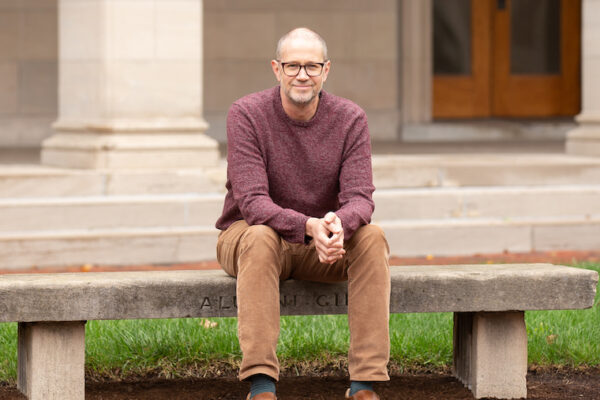Carl Phillips, professor of English in Arts & -Sciences, spent the spring semester teaching, writing — and picking up the Pulitzer Prize for Poetry for Then the War: And Selected Poems, 2007–2020. While he has quietly, unassumingly become one of the most accomplished poets of his generation, he’s also building a legacy as a teacher of writing.

In late 2022, he published My Trade Is Mystery: Seven Meditations from a Life in Writing, which is being compared to Anne Lamott’s Bird by Bird or Rainer Maria Rilke’s Letters to a Young Poet. Through a series of essays, he draws on decades of teaching and writing to create a guide “not in terms of how to write or to be a writer,” he writes in the preface, “but in terms of how to live, as a writer.”
Below is an excerpt from the chapter “Ambition,” which he wrote before winning the Pulitzer. It indicates that despite all the accolades he has earned, Phillips is not going to rest on his laurels.
Prizes are part of the politics that attend art the way flies attend horses. They ultimately distract from what, as far as I can tell, art is mostly about: the urgency of and devotion to and sheer pleasure in the act of making some form of expression for what it means to be a human body at this moment in time.
You need the arrogance to believe not only that you have something to say but that the world must hear it, and you need the humility to recognize both that not everyone wants to listen and that no one is in fact obligated to do so.
I often remind my students of what making a career in writing maybe most requires, besides luck, some talent and stamina: a constant calibrating and recalibrating of arrogance and humility. You need the arrogance to believe not only that you have something to say but that the world must hear it, and you need the humility to recognize both that not everyone wants to listen and that no one is in fact obligated to do so. This too seems part of the work of ambition.
A steady drive, without expectation. An acceptance that to be an artist is to commit to a lifelong apprenticeship to master over what cannot truly be mastered, since the definition of art — as with the evaluation of excellence — is ever shifting and always subjective. Accepting the fact of this — indeed, even embracing it — will return you to that most important form of ambition that I mentioned earlier, the ambition for the work. When it comes to art itself, a prize is already irrelevant because it’s (usually) for work that’s finished; the committed artist will already have continued that fumbling forward into the unknown that is finally required for the work to keep deepening, to continue surprising. This ambition will keep your mind on the work, what matters most; as much as possible, let the work be everything, for the work will save you.
Excerpted from My Trade Is Mystery: Seven Meditations from a Life in Writing, by Carl Phillips, published by Yale University Press. Copyright © 2022 by Carl Phillips. Reprinted by permission of Yale University Press.


